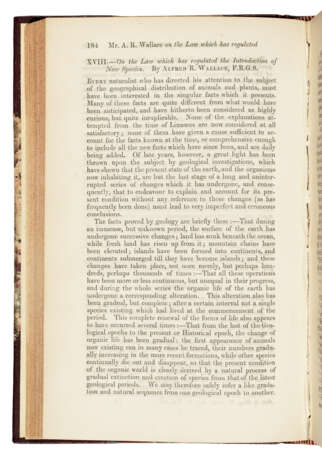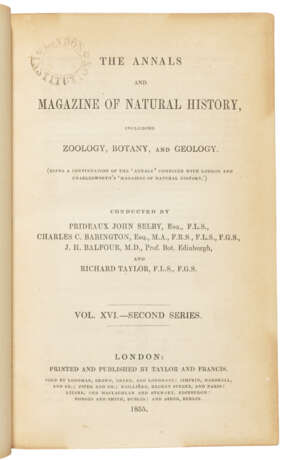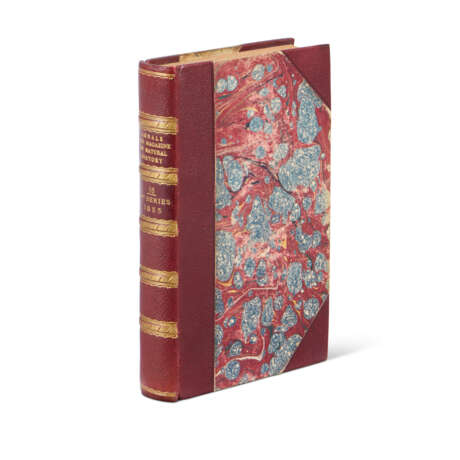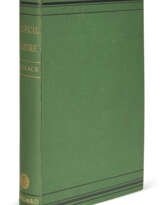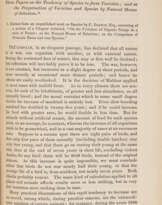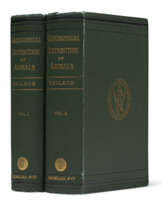ID 1249823
Lot 179 | WALLACE, Alfred Russel (1823-1913)
Valeur estimée
£ 30 000 – 50 000
‘On the Law which has Regulated the Introduction of New Species.’ In: The Annals and Magazine of Natural History. Volume XVI, Second Series. London: Taylor and Francis, 1855.
‘By your paper… I can plainly see that we have thought much alike’ (letter from Darwin to Wallace, 1 May 1857): the exceptionally rare first edition of the ‘Sarawak Law’ paper, a major landmark in the history of evolutionary theory. We are unable to trace any other copy at auction.
The present article is ‘the first ever British scientific paper to claim that animals had descended from a common ancestor and then produced closely similar variations which evolved into distinct species’ (McCalman, Darwin’s Armada).
Wallace had been studying the geographical distribution of animals and plants for many years when, in 1854, he departed for explorations to Southeast Asia and the Malay archipelago that would last eight years and cover approximately 15,000 miles. On his travels, he kept a detailed notebook on the theory of the evolution of species, to which he had been quietly committed since 1845. The present paper, ‘a concise synthesis of his ideas on the subject’ (DSB), was provoked by an article written by the English naturalist Edward Forbes, Jr., in which he emphatically denied the notion of ‘organic progression’. Described by Wallace himself as ‘the announcement of the theory’ and by biologist Andrew Berry as an ‘evolutionary bombshell’, the ‘Sarawak Law’ paper laid out ‘a credible framework for a theory of evolution’ (Partridge) based on a simple ‘great law’:
the great law which has regulated the peopling of the earth with animal and vegetable life is, that every change shall be gradual; that no new creature shall be formed widely differing from anything before existing; that in this, as in everything else in Nature, there shall be gradation and harmony.
‘Although the article was carefully worded, Wallace had definitely announced that he was an evolutionist’ (DSB). The impact of this paper on Charles Darwin and his subsequent development of evolutionary theory has been much studied. In a letter to Wallace of 1857 (BL MS 46434), Darwin praises the article as follows:
By your letter & even still more by your paper in Annals, a year or more ago, I can plainly see that we have thought much alike & to a certain extent have come to similar conclusions. In regard to the Paper in Annals, I agree to the truth of almost every word of your paper.
In spite of his praise, the academic consensus is that Darwin failed to fully appreciate the significance of Wallace’s paper. His biographer Janet Browne claimed that ‘Darwin blindly stared straight past the implications in Wallace's words’ (Voyaging, 1995), while biologist Richard Dawkins has stated that ‘oddly, Darwin did not see in the 1855 paper any warning that Wallace was by then a convinced evolutionist’ (Science in the Soul, 2017). Charles Lyell, another early reader and admirer of the Sarawak paper, saw in Wallace a potential competitor to Darwin and urged the latter to publish his own views on the origin of species as soon as possible.
‘The immediate stimulus for Darwin, however, was a paper written by Wallace entitled “On the Tendency of Varieties to Depart Indefinitely From the Original Type.” After publishing his evolutionary paper in 1855, Wallace had continued to search for an evolutionary mechanism. Very ill with malaria while on the large island of Gilolo (Halmahera), some ten miles from Ternate, he formulated the principle of natural selection, the now famous mechanism of evolution: and upon returning to Ternate, he mailed a paper (and covering letter) to Darwin expounding his long-sought discovery (9 March 1858)’ (DSB). The receipt of that paper, proving that Wallace had independently arrived at similar conclusions about evolution, was the catalyst for Darwin to condense his own thoughts on the subject. Wallace’s paper was subsequently read to the Linnean Society and published on 20 August 1858, without the author’s consultation, alongside an essay by Darwin and prefatory remarks by Hooker and Lyell emphasizing Darwin’s priority of discovery, and the Origin would appear in late November 1859.
Wallace’s reaction to Darwin’s landmark work was full of the highest praise: ‘Mr. Darwin has given the world a new science, and his name should in my opinion, stand above that of every philosopher of ancient and modern times. The force of admiration can no further go!!!' (quoted by Janet Browne, Charles Darwin II). The ‘Sarawak Law’ paper, largely unrecognised in its day as a revolutionary work of evolutionary thought, is today understood as a key landmark in the convergence of two extraordinary thinkers on a common understanding of the origin of species.
Partridge, Derek & Smith, Charles. ‘The Impact of A. R. Wallace's Sarawak Law Paper Resurrected.’ Alfred Russel Wallace Notes 10, 2020; van Wyhe, John. ‘The impact of A. R. Wallace's Sarawak Law paper reassessed’, Studies in History and Philosophy of Science Part C, Volume 60, 2016, pp.56-66.
Octavo (208 x 134mm). 11 lithograph plates at rear of volume. Modern burgundy half morocco over early marbled boards. Provenance: London Institution (ink stamp on title) – William Pickett Harris Jr. (1897-1972, American investment banker, later Associate Curator of the Museum of Zoology at the University of Michigan and Trustee of the Cranbrook Institute of Science; pencil inscription dated 11/1/37 recording gift to) – Cranbrook Institute of Science, Michigan (embossed stamp on title).
| Artiste: | Alfred Russel Wallace (1823 - 1913) |
|---|---|
| Lieu d'origine: | Europe du Nord, Europe, Royaume-Uni |
| Catégorie maison de vente aux enchères: | Médecine et sciences, Livres et manuscrits, Livres imprimés |
| Artiste: | Alfred Russel Wallace (1823 - 1913) |
|---|---|
| Lieu d'origine: | Europe du Nord, Europe, Royaume-Uni |
| Catégorie maison de vente aux enchères: | Médecine et sciences, Livres et manuscrits, Livres imprimés |
| Adresse de l'enchère |
CHRISTIE'S 8 King Street, St. James's SW1Y 6QT London Royaume-Uni | |
|---|---|---|
| Aperçu |
| |
| Téléphone | +44 (0)20 7839 9060 | |
| Commission | see on Website | |
| Conditions d'utilisation | Conditions d'utilisation |
